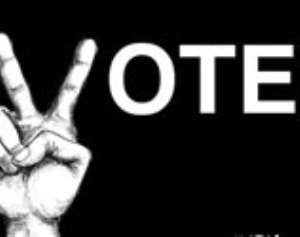
The Electoral Commission says it will allow prisoners to exercise their franchise in the upcoming elections if the law courts orders it to do so, and the electoral officials will be assured of their security in the prisons.
"The commission is not against the right of prisoners to vote. Once the courts say we should go and set up registration centres and polling stations at the prisons, we will go," Dr Kwadwo Afari-Gyan, Chairman of the EC said.
He was speaking at a colloquium on "Preparations for the 2008 Elections" in Accra yesterday.
The question of whether or not prisoners of 18 years and above who are of sound mind and who are willing to vote, could vote, has generated debate in the media recently.
Those calling for prisoners to be allowed to exercise their franchise, base their arguments on Article 42 of the Constitution which says: "Every citizen of Ghana of eighteen years of age or above who are of sound mind, has the right to vote and is entitled to be registered as a voter for the purposes of elections and referenda."
Dr Afari-Gyan said according to the electoral law, one must be resident at the area where he votes but a prison cannot be said to be a place of residence.
He added that traditionally, the commission does not set up registration and polling centres at places such as the prisons and chiefs' palaces.
He said there is a conflict between the residency requirement of the law and Article 42 and it would, therefore, be in the best interest of everybody if those calling for prisoners to be enfranchised, seek clarification at the law courts.
"It is the courts that can get them out to come and vote and if that happens, the EC cannot prevent them. But if we are going to do this, we must get assurances that our officials will be safe," he stressed.
The colloquium, organised by the Coalition of Domestic Election Observers (CODEO), aimed at providing a platform to discuss the country's preparedness towards the 2008 elections and in particular that of the EC and election observers.
It brought together domestic election observation groups, the media, political party representatives, the security agencies, academia, civil society and the diplomatic community.
As to whether the commission has adequate funds to conduct the elections, he said the commission has not been given all the money [GH¢41million] it would need for the elections, explaining that the money is normally released to the commission in phases.
"All the money that we have asked for has been given," he said.
Dr Afari-Gyan said, the commission has no legal powers to deal with abuse of incumbency adding that the political parties' code in which the parties have agreed not to behave in a certain manner that does not conform with the democratic process is not legally binding, resulting in the parties sometimes going contrary to the code.
Dr Afari-Gyan said the parties are also supposed to account to the commission, their financial expenditures but that does not normally happen and even when they present their reports, they are not satisfactory.
He said it was not prudent for any political party to declare election results unilaterally, because that could cause chaos and urged the media to give blackout to any political party that declares the results.
Dr Afari-Gyan said the commission would not accredit "faceless" election observers in the 2008 elections and advised organisations that would want to observe the elections to submit the names and photographs of all those who would be observing the elections.
He said the committee set up to look into alleged bloated voter register in Ashanti Region was being given ample time to do its work and advised people to stop what he described as the conspiracy theories.
Source: The Ghanaian Times




 We’ll no longer tolerate your empty, unwarranted attacks – TUC blasts Prof Adei
We’ll no longer tolerate your empty, unwarranted attacks – TUC blasts Prof Adei
 Bawumia donates GHc200,000 to support Madina fire victims
Bawumia donates GHc200,000 to support Madina fire victims
 IMF to disburse US$360million third tranche to Ghana without creditors MoU
IMF to disburse US$360million third tranche to Ghana without creditors MoU
 Truck owner share insights into train collision incident
Truck owner share insights into train collision incident
 Paramount chief of Bassare Traditional Area passes on
Paramount chief of Bassare Traditional Area passes on
 Two teachers in court over alleged illegal possession of BECE papers
Two teachers in court over alleged illegal possession of BECE papers
 Sunyani: Victim allegedly shot by traditional warriors appeals for justice
Sunyani: Victim allegedly shot by traditional warriors appeals for justice
 Mahama vows to scrap teacher licensure exams, review Free SHS policy
Mahama vows to scrap teacher licensure exams, review Free SHS policy
 Government will replace burnt Madina shops with a new three-story, 120-store fac...
Government will replace burnt Madina shops with a new three-story, 120-store fac...
